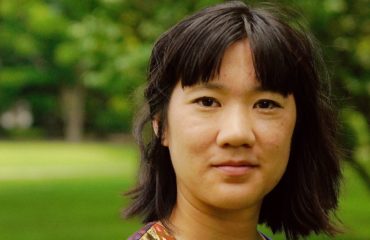Julia Thacker’s debut collection To Wildness was recently awarded the Anthony Hecht prize...

SEPTEMBER INTERVIEW with Julia Thacker

FEBRUARY MONTHLY: INTERVIEW with CLAIRE HOPPLE
From the first sentence of Claire Hopple’s latest novel, Take It Personally, you know you’re in...
JUNE MONTHLY: In Solidarity with the Palestinian People
Nearly a year after the October 7 Hamas terrorist attack and Israel’s subsequent escalati...

ECOPOETRY FROM JAPAN with Ryoichi Wago and Rumiko Kora, trans. Judy Halebsky & Ayako Takahashi
TRANSLATOR’S INTRODUCTION by Judy Halebsky THREE POEMS by Rumiko Kora, trans. Judy Halebs...

INTRODUCTION TO KORA RUMIKO & WAGO RYOICHI by Judy Halebsky
THREE POEMS by Rumiko Kora, trans. Judy Halebsky & Ayako Takahashi FIVE POEMS by Ryoichi Wa...
THE PLUME by Susan Neville

From the outside, the Garden City Church of Christ looks like any small rural church. The building is just large enough for a sanctuary, a small vestibule where the greeters stand, an office in the back, and a basement where the choir practices and where Sunday school classes and church dinners are held. Four steps lead to the front door, the exterior paint is mildewed, the steeple seems tacked on. It’s as though it’s not a building at all, just a part of the landscape that has formed temporarily, ghost-like, into the shape of church.
The same ephemeral nature is true of the other buildings and businesses along the stretch of road that forms the unincorporated town of Garden City. There are houses made with asbestos-laced asphalt siding, trailers on cement blocks, a pole barn used for motorcycle and small tractor repair, a small pig farm, an abandoned filling station, one or two truck gardens, a cemetery, and a drive-in restaurant that serves chile dogs and tenderloins and is open five months out of the year. The government has fitted the drive-in with an elaborate water filtration system, as is true of the church and a few of the other inhabited buildings.
Everything in Garden City is separated by temporary fencing. There are no hardware stores, no clothing stores, no drug or grocery stores. Garden City, in other words, is just a strip of civilization along a strip of road, surrounded by dreaming fields of corn and beans.
When I was a child, and growing up in Garden City, I thought I knew everything there was to know about it.
If you find yourself there now, you’ll have to drive another twenty minutes or so to get to the larger town that houses the county courthouse and the factory that makes engine parts and still feeds and clothes and shelters everyone in the county to various degrees. The newer Japanese plants that make circuit boards are located even farther out in the country. They’re rectangular windowless buildings with the company name in crimson lettering. These factories seem to appear overnight as though pushed up through the soil by an underground rectangle, like those sculptures made on pinscreens. You know the ones—where you can press the pins from underneath with your hand and suddenly there’s a 3D impression of your hand. Take your hand away and it’s as though you were never there at all.
If you’re an executive at the engine factory, you’re originally from one of the coasts, and if you’re an executive at one of the new Japanese plants, you’re either from Japan or one of the coasts. No one informed you about the plume before you came, and when you found out, if you found out, you were assured you were safe from it. The plume is nothing, just leftovers from the filling station, you were told if you asked. It’s a thing that happens everywhere. We’re on top of it.
In any case, you may have driven through Garden City on your way to your new home on the man-made lakes and not paid much attention to it. Or you may have passed through on your way to the tourist town that sells fried chicken and apple butter in the autumn or on your way to the university two hours away or on your way to the country mechanic, his yard filled with rusted parts and his helpers sucking down beer and falling asleep from a combination of the beer and fumes.
Oh, who knows why you drove through, really. The ‘why’ is just something we fill our time with, sitting on our porches watching the cars go by. That’s what you think of us, right? That’s all we do, just watch you go by, centers of the universe. So maybe you have a mistress or know a prostitute who lives out in the dark spaces. Maybe your grandmother lives out in the country. Maybe you’re looking for drugs. Maybe you’re on the lam. Maybe you’re nostalgic for something, perhaps the Milky Way, and you think you might find it if you drive far enough into the country. I only know you most likely didn’t notice that the place had a name and that the church was named after the place. And it is a place. It is deeply placed in fact, as the church can attest. I was baptized in its pool. The church member who nursed my parents in their oldest age lives in one of the asphalt-sided houses. There are red geraniums in a pot on her front porch. The geraniums aren’t real, and yes, she has one too many lawn ornaments.
However, I’ll give you this: if you did notice the name of the place for some reason, you probably commented on the fact that no place in the world could look less like a city or a garden. On that we can now agree.
To go on: inside the church, the benches are made of pine, like caskets. The windows of the church are clear glass, the walls are grayish white, the floors are sloped and clad in worn blue carpet. Over fifty years ago someone painted a picture of a river and trees on the wall behind the baptismal pool. The river is chipped and faded, is poorly drawn but recognizable as river.
The white robes for baptisms hang just off stage, like sheets for a Halloween costume or Christmas pageant. Ghosts or wisemen.
Why am I telling you this? Out of love, I suppose, for this little strip of human habitation. Out of anger. Out of the wish to confess.
Oh, where to begin? With the hundreds of saints who have, over the years, dipped their white-robed bodies in the water of the Garden City Church of Christ baptismal pool, infusing sin into the pool like they were bags or balls of tea, emerging cleansed and holy?
The bitter dregs of our sins go down the drain every Sunday afternoon when the baptistery is drained and cleaned. It is refilled with water and chemicals every Friday and blessed early Sunday morning.
The water, by custom, bypasses the pipes when the pool is emptied and the holy water is pumped directly into the ground. The water, when it leaves the sacristy, rejoins the plume which is also, though little understood or talked about, its source. Was it our fault, the plume? Did we begin the separation of the body from the soul, the sin from the sinner? Isn’t it human to want to be cleansed? To pitch the dirty water from scrubbing potatoes outside the kitchen door?
It’s the plume I imagine now when driving by the church, when I sit in my car at the drive-in, eating chile dogs and root beer. I live farther out in the country now. Every summer my parents, the innocents, went to the drive-in for their anniversary. They brought me along. I acquired a taste. This was before we knew about the plume, though the plume was already there underneath us, phosphorescent, corrosive, on the move. Whale-shaped, the tip of its fin on top of the ground at the abandoned gas station. This was when we still trusted all the wells.
The knowledge of the plume came slowly. I have to say that it appeared first in our dreams. We dreamed of feathers and tornadoes, of rushing water and wind. Then it moved from our dreams to our senses.
First, there was the odd taste of something like oil in the coney sauce. Had the proprietor changed his ingredients? No, he had not. He added more brown sugar and it seemed to solve the problem for a while. And then the slight odor of oil in our morning coffee, the film of oil we attributed to the coffee itself. And then there was the graying of the glasses of cool water that came from the sinks, the increase in precipitate. We were used to variations in taste during harvest time and planting season. But there was the odor of something acrid in the baptismal pool, something other than chlorine, cologne, aftershave, and old hymnals on Sunday mornings.
For a while the preacher kept adding more chlorine to mask the smell. He attributed the need to an increase in the numbers of those wishing to be baptized, to the power of his sermons which were, to be honest, never powerful.
When the gas tanks first came down, when the station closed, there were pools of black sludge on the ground by the church. No real problem there we thought at first, nothing dangerous, a minor inconvenience. Oil on your workclothes, gasoline in your car, oil in the petroleum jelly you used occasionally on your skin. Familiar, the smell of oil.
But then, finally, we had to face it: the trucks that appeared at night, driving out from the engine factory. We knew what was going on. We all knew. Some of us had driven those trucks out to the dumping grounds, the expendable places. We just didn’t know we would be added to the list so soon, that we ourselves had become expendable. And so we trusted when the company said it was all safe, that the gas station tanks were built for just this contingency. The owner of the station kept making money from his failed business. Our sin-tinged holy water was so very pure by comparison.
The brain tumors came later. By the time they started blooming in our heads, muddling our responses, the owners of the land and factory had moved offshore.
I am a reliable witness and what I’m telling you is the truth. The first job I ever had was on the burr bench at the engine factory. It was the job you began with and the one you wanted to leave as soon as you were given a promotion to the line. Your job on the bench was to take a chemical so strong it made you hallucinate, so corrosive it ate through your gloves, and to work that acid into the engine parts to remove the excess bits of metal. For many years this was done by hand, the rubbing away of the burrs on the rods and cylinders. We thought of them as the thorns on a rose, on the crown of thorns. We were doing God’s work. You had to have an eye for it, a feel for the sharp places on the steel. You had to know how to apply the corrosive, how hard to apply the pressure so the engine part left your bench polished and smooth. What was left at the end of the day were the chemicals in a pool filled with dissolving metal burrs. It was not unlike the baptism pool, you’re thinking. We thought. At night the liquid was siphoned into tanks and driven out into the dark country where it was poured into the ground behind the abandoned gas station next to the Church of Christ. Who would complain? Who would we complain to? Where would our livelihood come from if we did? We would have done the same thing if we were the bosses. By morning it had seeped into the ground except for the small puddle joining with the sludge and surrounded by a fence.
It took a long time until we understood that the acid ate its way into the earth and formed a plume filled with the dissolving metal thorns and toxins, that the plume was making its way toward all the water in the world, feeding off its innocence, waiting to rise from the ground like the tornado in our dreams. Honestly, none of us stands a chance against it.
What happened to Christ’s crown of thorns? I used to wonder this. It fascinated me, the rivulets of blood streaming down his face. Was the crown removed with Christ’s body and placed into the tomb? Was it left by the cross? Might some bare-footed Roman have stepped on one of the thorns and if so, was he healed or sickened? Was the crown purified by blood or was it poisoned? Was it broken up and sold, thorn by thorn, as relics? Did it perform miracles? Or did it decay, corroding everything it touched?
I think the latter. I think it became the first plume, and every plume after that one yearns to join it. It pulses beneath the ground in this garden planet. There’s not much time now, so dip your body into any untainted water you can find, if you can find it still. It’s coming to a boil beneath your feet. Purify yourself. Rid yourself of the complicity if you can.

OCTOBER INTERVIEW with EDWARD SALEM
Edward Salem is a poet who hasn’t lost his sense of humor. “Palestinians,” he shares in our int...

SEPTEMBER INTERVIEW with LIZA HUDOCK
Addiction, death, and loss are everywhere in Liza Hudock’s debut collection, Reveille (released...

SEPTEMBER INTERVIEW with Julia Thacker
Julia Thacker’s debut collection To Wildness was recently awarded the Anthony Hecht prize...

JUNE INTERVIEW WITH STEVEN ESPADA DAWSON
Late to the Search Party is the debut collection of Steven Espada Dawson, exploring the individ...

MAY INTERVIEW WITH SOPHIA TERAZAWA
When readers first meet the narrator of Sophia Terazawa’s novel, Tetra Nova, published by Deep ...


